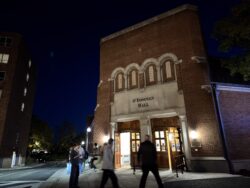In the four years that I have been a member of the Georgetown University community, my outlook on life has changed profoundly. Becoming involved with my union gave me a sense of purpose and conviction. UNITE HERE Local 23 represents 10,000 members across the United States in various sectors of the hospitality and food industry. For Georgetown that means the dining hall workers in Leo’s, Hoya Court, the Jesuit Annex, Bulldog Tavern, the Georgetown Catering and Georgetown Hotel and Conference Center workers, and last but not least, the parking workers near the hospital.
I became active in my union because I did not want to become like my mother, who I watched suffer abuse for years at each company for which she worked. She would come home and tell me story after story about how companies docked her pay, refused to pay her for the hours she worked, humiliated her in public and behind closed doors, and deprived her of dignity. This took an emotional toll on my mother as she gave up on upward mobility for herself and for me, deciding to stick it out at one horrible company after another before being unjustly terminated. I watched hopelessness consume her.
I quickly realized that I would fall into the same trap as my mother here at Georgetown: working from paycheck to paycheck, feeling stuck in the rat race with no way to better my situation or move up the ladder of society. Instead of waiting for that same feeling of helplessness to wreak havoc upon me, I joined the Union Committee to fight for respect and a better way of life.
The struggle was unionizing Hoya Court, Catering, and the Georgetown Hotel. In 2015, we talked and agitated people around specific issues like respect and wages, bringing workers to realize the truth about the nature of their exploitation and how to fight it. We convinced workers that we could indeed win, brought them out to actions, and fostered willingness to face the company and the university itself, if need be.
It took effort, time, and the unity of my coworkers to succeed against a company which we thought was so much larger than ourselves. But in the end, we realized the value of our labor and that we, the workers, are the ones who make the wheels turn and the ones who can bring them to a screeching halt. After those months of organizing, planning, talking, encouraging, and marching, we beat Aramark and secured one of the best contracts in the District.
Because of that fight, I am proud to say that I have health insurance, which allowed me to visit the doctor for the first time in about two decades and get glasses which enable me to see clearly for the first time in over thirteen years. Good raises and benefits give me hope of living well and having a future. The world in which my mother lived was one I knew I could change, so long as I dared to fight.
In the two years since that battle, I have had the experience of traveling across the country, meeting hundreds of union and nonunion workers. We continue to organize and fight against those who value their profits more than our livelihoods and dignity. I’ve given speeches, represented UNITE HERE at the White House, and traveled to different states to be a part of various union campaigns and solidarity actions. No matter where I am, from Phoenix, Arizona to Cambridge, Massachusetts, I can never forget the fundamental lesson that I learned at Georgetown: working people, united, can never be defeated.
The collective and united voice of those who are determined to resist exploitation can shape history and elevate our individual voices, as well as those of our children and grandchildren for generations to come. That voice screams out for the promise of upward mobility and the respect for hard work that is associated with economic security and stability. In essence, the American dream is one which transcends race, gender, and all dividing factors that working people face. It is a dream which can only be obtained, defended, and expanded upon by coming together for the collective good.
I call this place home, but there is still much work to be done. I have a vision where food service workers, subcontracted or not, are treated as essential university staff, with all the respect and benefits that come with such association. A vision where unions are more heavily involved in local politics, supporting their members not only at work but also in our communities, and where members of the working class are represented in government offices, from the lowest to the highest levels.
My mission as an organizer is to empower, and in the development of that goal, I’ve learned lessons of maintaining personal relationships, building community, establishing trust and showing solidarity. Historically, the dignity of workers has only been heard during select periods when workers fight for short term needs. I envision a world where workers are “permanently militant,” whether during contract fights or not: they actively know their rights and want to expand them. At the slightest sign of disrespect from a boss, workers would be ready to take collective action and build solidarity, not only on campus, but also with different locals, unions and causes. The struggle must go on until it is won, and it must spread to every single person who believes in a better day and a promising future. For an injustice to one is an injustice to all.







